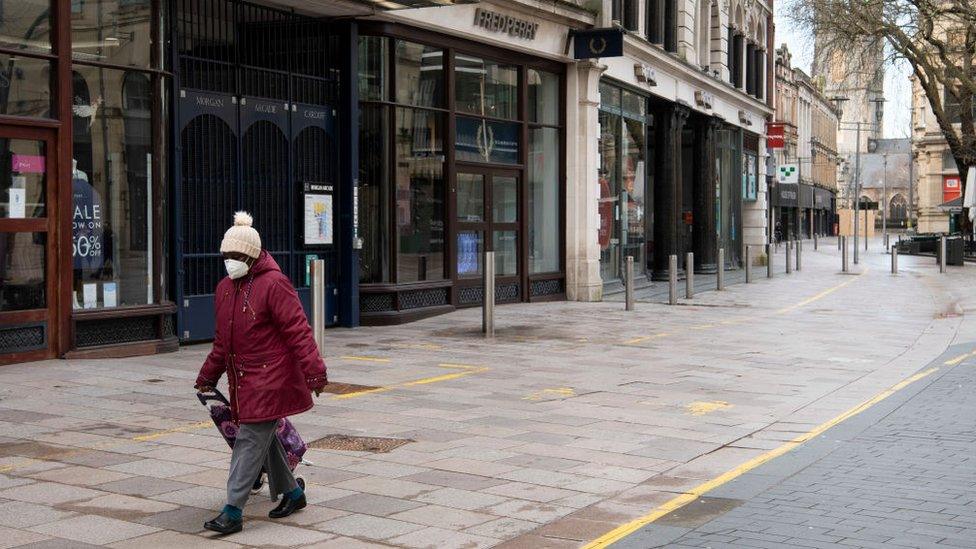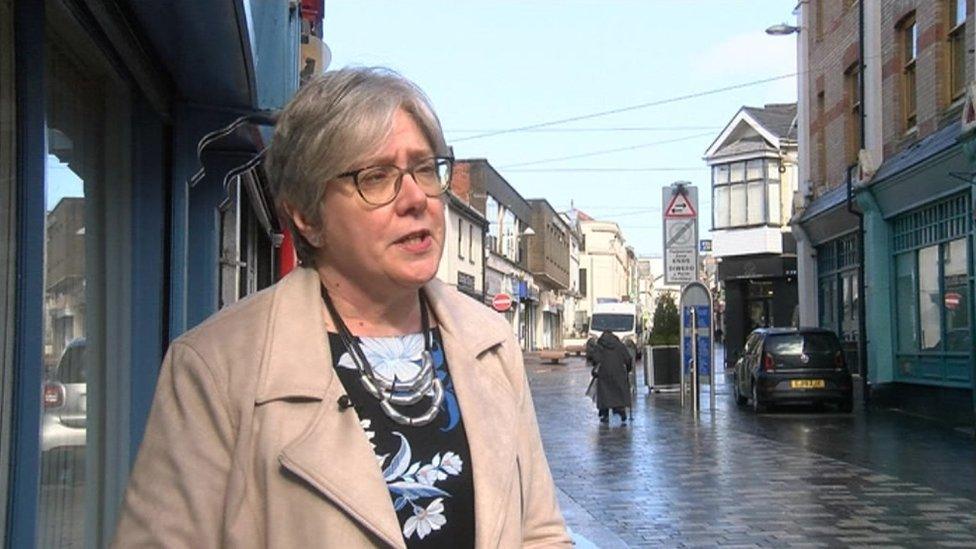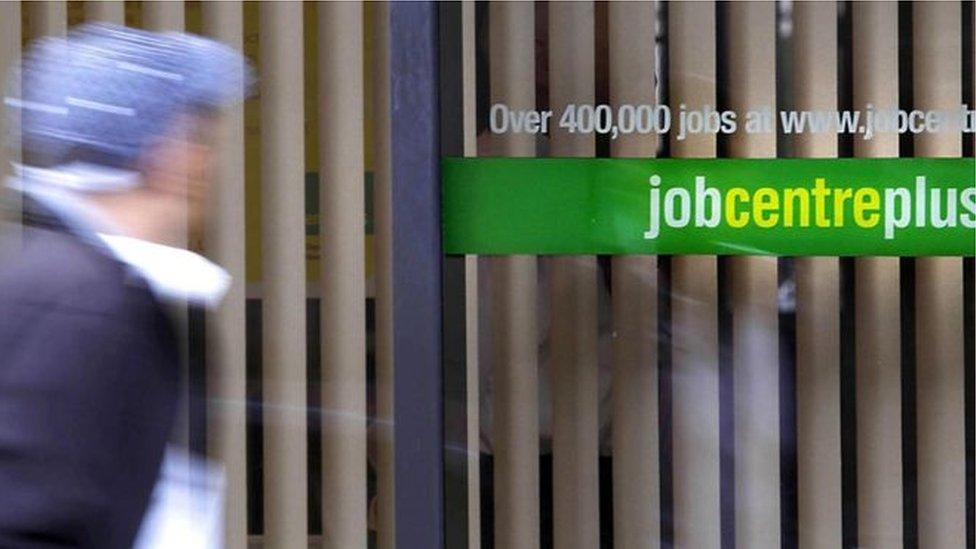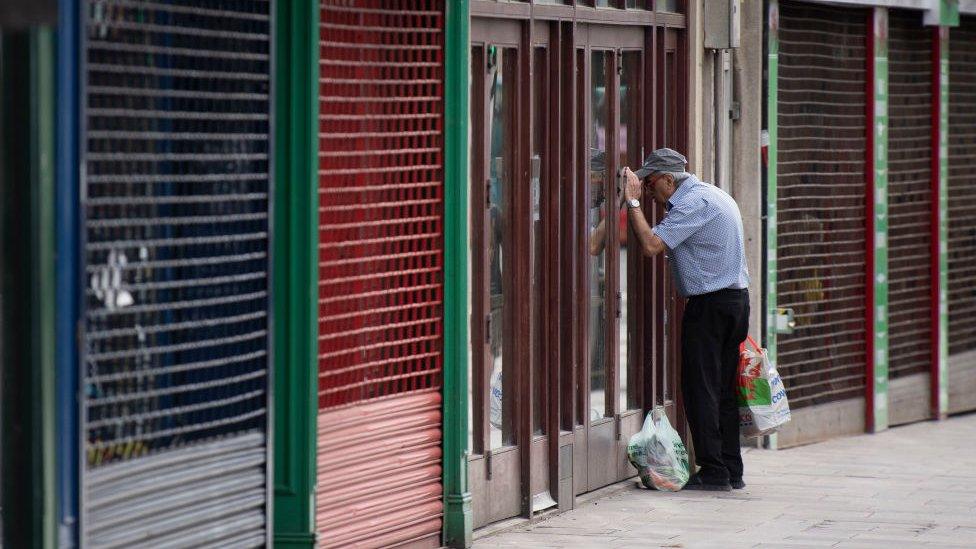Covid: Wales' unemployment rises again amid pandemic
- Published
- comments

Wales has the second-highest rate of growth of unemployment in the UK, after London
Wales' rate of unemployment has risen to 4.6% in the three months to November as coronavirus continued to hit the jobs market, latest figures show.
There were 71,000 people unemployed and looking for work in Wales in November - 14,000 more than in the three months to August, according to the Office for National Statistics (ONS).
There were 25,000 more people out of work than at the same time last year.
UK-wide, the unemployment rate rose to 5%, up from 4.9%.
Economy Minister Ken Skates said the figures were a "stark reminder of the severe impact coronavirus continues to have" on people, businesses and the economy in Wales.
Wales continues to have a lower rate of unemployment than other nations and regions of the UK, but in the past year it has had the second-highest rate of growth of unemployment, after London.
The latest figures also showed how many people were on company pay rolls in December. Across the UK, there were 800,000 fewer than in December 2019.
Average monthly wages in Wales have risen by 5.4% to £1,784, which suggests many low-paid jobs have been lost.
The hardest-hit sectors of the economy were the arts, entertainment, accommodation and food.


While there are 25,000 more people unemployed in Wales than 12 months earlier, the number of people claiming work-related benefits - known as the claimant count - has risen by 87% between December 2019 and December 2020.
Universal Credit is paid to people who are out of work but also those people who are struggling to make ends meet, for instance if they are actually working for fewer hours or because of low pay.
In December there were 112,600 people in Wales claiming work-related benefits.
These claimant count figures show that the pandemic has not just made some people unemployed but has also made others poorer.

'It's very, very hard'
Chris Reynolds, 23, from Cardiff, finished his master's degree in February - just before the pandemic hit.
He had planned to try to get a job in film and television production, but he took a job working nights at Tesco in March.

Chris Reynolds finished a master's degree shortly in February - and then got a job working nights at Tesco
The job lasted until August and he was unable to get an extended contract due to "a rush of people who had lost their jobs as lockdown started", meaning he was out of work for "a month or two".
Mr Reynolds received support from The Prince's Trust in Wales and soon landed a job with a social media marketing company, where he has been working since November.
He said he thinks many people with degrees have been shocked at not being able to find work.
"The jobs aren't just being handed out to everyone, even though you have a degree and what surprised me was that there were actually quite a lot of jobs being advertised," he explained.
"It is very, very hard, especially being stuck at home as well. It's not like you can meet up with people in a cafe over coffee and have a chat with someone to kind of keep your mental health quite high."
'A lasting scar'
The disproportionate effect of unemployment on young people will "leave a lasting scar on that generation", according to Victoria Winckler, director of the Bevan Foundation, an anti-poverty think tank.
She said the ONS figures "don't really tell us the full story" and could "give us a false sense of security".

Victoria Winckler said the ONS figures "don't really tell us the full story" of the unemployment figures
"I would expect that there are more people who are not working but not showing up in the figures," she said.
"Not everybody who is unemployed claims benefit - perhaps because their partner is working or someone else in their household has an income or they have savings."
While the disease has tended to effect older people more, Ms Winckler said younger people had taken a "huge hit" in terms of economic prospects.
She added: "The figures to June show nearly one in five young people in Neath Port Talbot was unemployed. That's a huge proportion, and one that's going to leave a lasting scar on that generation."
Mr Skates said later this week the Welsh Government would outline details of a further £200m to support Welsh businesses and jobs.
"We are continuing to do everything in our power to protect firms and jobs from the effects of the pandemic, whilst also helping people to find new employment," he said.
He said so far more than £1.7bn had reached businesses across Wales, through the Welsh Government, which has protected more than 125,000 jobs that "might otherwise have been lost".
- Published15 December 2020

- Published13 October 2020

- Published26 March

- Published10 May 2024

- Published15 September 2020

- Published12 August 2020
